Extend Volume Greyed Out? Fix Can't Extend Volume in Windows [New]
If you're experiencing the error where the Extend Volume option is greyed out when trying to increase the space of your C drive or other partition on Windows 11/10, you're not alone. This issue can occur on Windows 11/10/8/7 and even Windows Server computers. To resolve the "can't extend volume" error, you can try checking why the Extend Volume Option is greyed out and follow the solutions provided to fix the issue.
Here are the best solutions to enable extend volume in all your hard drive partitions:
Can't Extend Partition, Extend Volume Grayed Out
The "Extend Volume" option is greyed out in Disk Management because the unallocated space must be immediately adjacent to the existing volume. To fix this, you need to merge the unallocated space with the existing volume. To do this, you can delete the unallocated space and then extend the C drive. Alternatively, you can create a new volume in the unallocated space and then extend the C drive. You can also use the built-in Windows utility, DiskPart, to extend the volume.
The Extend Volume option is likely greyed out because the disk you're trying to extend is already at its maximum size, or it's a system disk and can't be extended. To fix this, you can try using the built-in Disk Management tool to extend the volume, or use a third-party tool like EaseUS Partition Master to resize the disk. If the disk is a system disk, you may need to create a new disk and move the operating system to it, then extend the new disk. If you're still having trouble, you can try running the built-in Disk Cleanup tool to free up space on the disk, then try extending it again. If none of these solutions work, you may need to consider replacing the disk with a larger one.
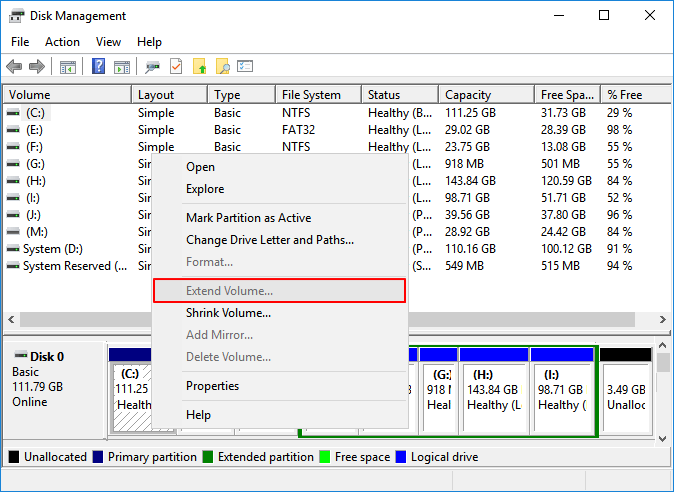
If you're experiencing issues with the Disk Management tool not allowing you to extend a volume, don't worry! This tutorial will help you understand why the "Extend Volume" option is grayed out and provide effective solutions to enable it, allowing you to extend partitions in Windows 10/8/7 for free.
NOTE: It's impossible to extend or add partition space with free space on a second basic disk, so ensure the free space and the volume to extend are on the same disk.
Why Is Extend Volume Grayed Out
If you're unable to extend the volume on your C drive, don't worry! To troubleshoot, open Windows Disk Management, check the state of your disk partition, and consider the following reasons why the "Extend Volume" option might be greyed out:
- There is no unallocated space on your hard drive.
- There is no free space available to extend the partition.
- Windows can't extend is a FAT or other format partition.
The Extend Volume option in Disk Management only works for RAW or NTFS partitions, and is not applicable for FAT or other format partitions on Windows PCs.
- Windows cannot extend a primary partition with unallocated space in an extended partition, or vice versa.
- The partition capacity on a Master Boot Record (MBR) disk has reached its 2TB limit, preventing further partitioning or expansion.
If Extend Volume is grayed out, it's likely due to a lack of unallocated space or an incorrect disk configuration. To enable Extend Volume, you can try using the built-in Disk Management tool or a third-party partition manager like EaseUS Partition Master. If the Extend Volume option is still unavailable, you can try deleting a partition or moving a partition to make space available for expansion.
Your Most Reliable Tool for Extending Volume
One of the main reasons why you can't extend a volume is due to Windows limitations. Windows disk management has a limitation where it cannot extend a specific partition, making it impossible to increase the volume size.
If you're experiencing the "Extend Volume Greyed Out" error and want to increase partition size, we recommend using a reliable tool called Qiling Partition Master to help you out. This tool can assist you in successfully extending your volume.
The Resize/Move and Allocate Space feature can effectively fix issues and help extend volume on Windows 11/10/8/7 by allowing you to resize, move, and allocate space as needed.
Fix Can't Extend Volume with no unallocated space
Fix Can't Extend Volume Error with no adjacent unallocated space
To resolve the issue of "Fix Extend Volume Greyed Out" on a FAT or other format partition, you can try the following steps. First, ensure that the partition is not in use by any other program or process.
To fix the issue of being unable to extend a primary volume with space on an extended partition or vice versa, you can try the following:
Fix Extend Volume Option Greyed Out in MBR 2TB partition
If you still prefer to use Disk Management to fix this error, you may try to enable Extend Volume and increase partition space using it now.
Method 1. Fix Can't Extend Volume Error without Unallocated Space
When your hard drive doesn't have unallocated space, you can't extend a volume. You can either use Disk Management or a partition manager like Qiling to help.
To enlarge your target partition on Windows 11/10/8/7, you can either use the built-in Disk Management tool or a third-party partition manager software. The Disk Management tool allows you to resize, extend, or shrink partitions, including the target partition, without losing any data.
#1. Make Unallocated Space and Extend Volume in Disk Management
If you're unable to extend the space on your C drive, you can enable the "Extend Volume" feature by following the same steps as before, allowing you to expand the drive's capacity.
Step 1. Make Free or Unallocated Space behind Target Volume
If you don't have free space or unallocated space on the computer drive, you'll need to delete an empty or useless partition or shrink a partition to create space next to the target volume before cloning.
1.Press "Windows + X" keys, click "Disk Management".
2.Right-click an empty partition next to the target volume, select "Delete Volume". Click "OK".
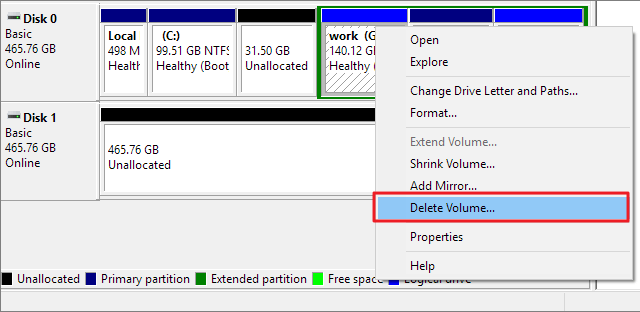
3. Right-click a neighbor partition with enough free space and select "Shrink volume".
4. To shrink a folder in Windows, select the folder you want to shrink, right-click on it, and choose "Properties". In the Properties window, click on the "General" tab, click on the "Shrink" button, and specify the amount of space to remove.
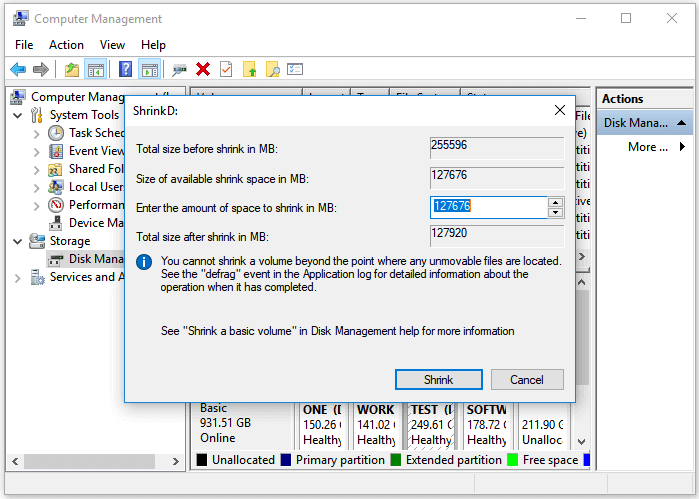
You are now good to go and follow the steps below to enlarge a hard drive partition without the "can't extend volume" error any longer.
Step 2. Enable Extend Volume, Increase Partition Size
1. In the Disk Management console, right-click the partition you want to extend and select "Extend Volume" from the context menu. This will open the "Extend Volume" wizard, where you can specify the size of the new unallocated space to add to the partition.
Extend the volume by selecting "Extend Volume" and adjust the size that you want to add to the target volume.
3.;Click "OK" to confirm.
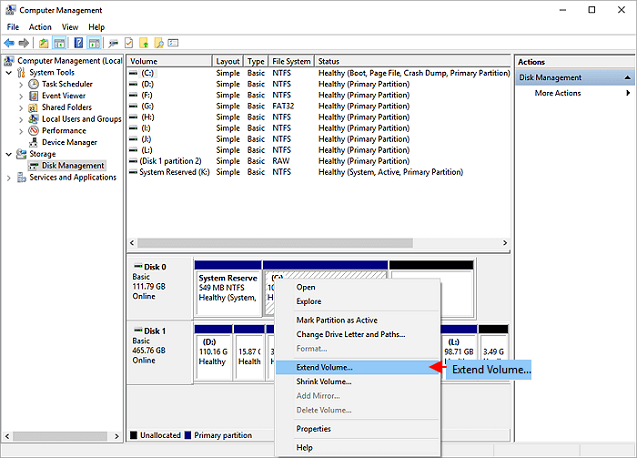
#2. Fix Can't Extend Volume with No Unallocated Space via Qiling Partition Master
Qiling Partition Master allows you to move free space from other partitions to extend a target volume using its Allocate Space feature, giving you flexibility in managing your disk space.
1. Click on the D: partition in the Disk Management page and select the "Resize/Move" option.
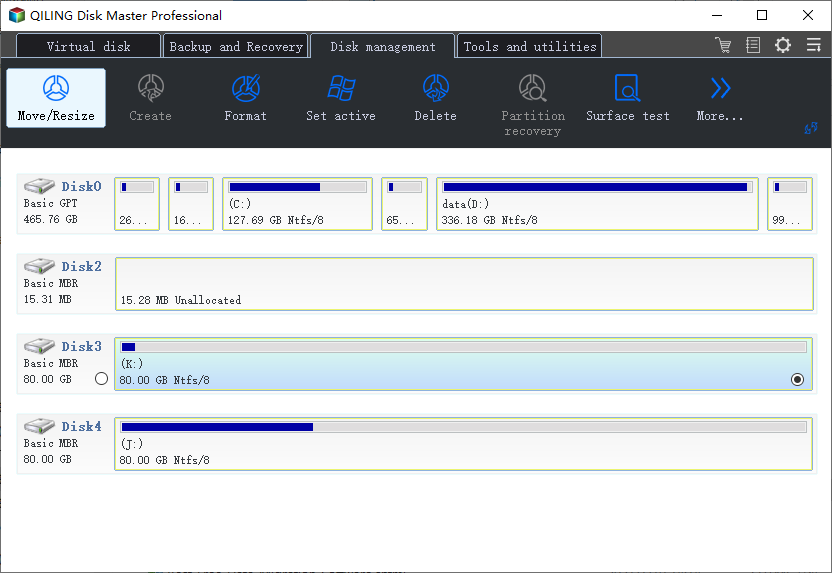
2. Reduce the size of the D: partition by dragging the left pane into the D: partition, then click "Proceed" to start the process.
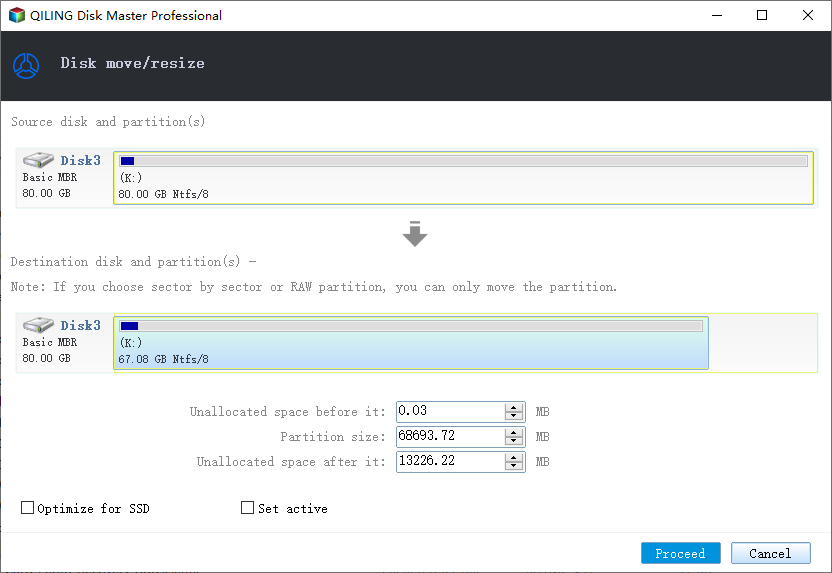
3. Click on the C: partition and select "Resize/Move" in the Disk management page.
4. To expand the C: partition, drag the partition end into the unallocated space and click "Proceed" to start the process.
Method 2. Fix Can't Extend Volume Error with No Adjacent Unallocated Space
If you have unallocated space on your disk but it's not next to your target volume, the Extend Volume option will be greyed out in Disk Management. However, you can use Qiling Partition Master to extend the partition with its Resize/Move feature.
Step 1. Locate the Target Partition
To extend a partition, first locate the target partition in the Disk Management page and select the "Resize/Move" option.

Step 2. Extend the Target Partition
To add unallocated space to your current partition, drag the partition panel to the right or left, depending on the desired direction, and then click "Proceed" to start the extension process. This will extend the target partition by incorporating the unallocated space.

Method 3. Fix Extend Volume Greyed Out on FAT or Other Format Partition
Due to Windows limitations, you can't directly extend FAT, exFAT, or EXT partitions using Disk Management. Instead, you have two options to fix this error.
#1. Extend FAT or Other Format Partition Using Qiling Partition Master
Qiling Partition Master allows you to extend a partition beyond the 4GB limit in Windows, making it easy to expand your target partition using either Method 1 or Method 2.
#2. Convert FAT to NTFS and Extend Partition in Disk Management
To convert a FAT partition to NTFS, you'll need to format or delete the partition, which will result in file loss, making this method not recommended. It's a time-consuming and risky approach.
Method 4. Fix Can't Extend Primary Volume with Space on Extended Partition or Vice Versa
Windows doesn't allow extending a primary partition with unallocated space in an extended partition, so you can only extend a logical partition with space in a primary partition.
To extend a volume, you'll need to use third-party partition manager software, such as Qiling Partition Master, as built-in tools like Disk Management are not capable of doing so.
Method 5. Fix Extend Volume Option Greyed Out in MBR 2TB Partition
In rare cases, creating a single volume on an MBR partition that reaches 2TB capacity can prevent further extension of the partition, causing the Extend Volume Option to grey out.
Convert the MBR disk to GPT disk to break the limit, but do not use Disk Management as it requires deleting all partitions to convert a disk.
Qiling Partition Master can convert MBR to GPT using its disk conversion feature, as described in the article "Convert MBR to GPT".
To partition a hard drive in Windows 10, start by opening the Disk Management tool. You can do this by searching for "Disk Management" in the Start menu, or by right-clicking on the Start button and selecting "Disk Management" from the Power User menu.
Conclusion
If you're experiencing the "Extend Volume greyed out" error, there are 6 reliable methods to help you fix it and extend partitions successfully. These methods can be applied whether you have free or unallocated space on your computer hard drive, allowing you to extend your volume and resolve the issue.
Qiling Partition Master Free Edition is a reliable and free tool for extending partitions, offering a more secure option that doesn't require deleting partitions, even when there's no unallocated space. This means that using this free partition tool to extend a volume won't result in any data loss.
Related Articles
- How to Convert GPT to MBR Without Operating System
- How to dual boot Windows 11/10 with Windows 8 or 7?
- How to Repair MBR in Windows 11? Here Is Your Guide
- SSD Optimzier for Windows 11 Free Download with Ultimate Guide
- 2022 Write Protected SD Card Format Software: Erase/Format Write Proteced SD/USB/Pen Drive
- MBR or GPT for SSD, Which Is Better and How to Choose?